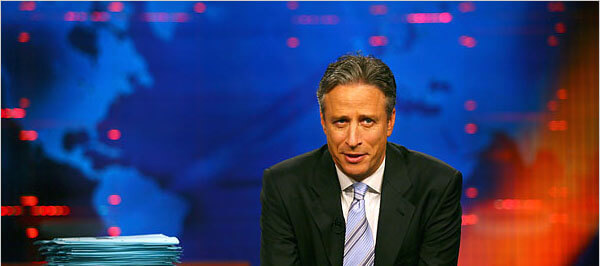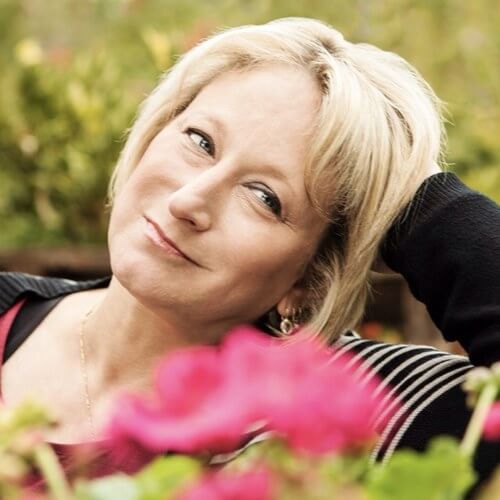

2016 election
Meet the Woman Who Invented “The Daily Show”
Madeleine Smithberg tells DAME about the maleness of late-night TV, and the way her pioneering show forever transformed the way we send up the news.
This article was made possible because of the generous support of DAME members. We urgently need your help to keep publishing. Will you contribute just $5 a month to support our journalism?
When Comedy Central sent Madeleine Smithberg, a former producer on Jon Stewart’s MTV show and David Letterman, and Lizz Winstead, a politically minded standup comedian, off to create The Daily Show, the network had just three major requirements for the women: It had to be on every night, it had to relate to current events, and it had to be funny. What they came up with would eventually change both comedy and politics.
The Daily Show premiered in 1996 with Craig Kilborn hosting—Jon Stewart took over in 1999—and though both women are no longer with the show the ripple effects of their work are reaching a zenith: The Daily Show will undoubtedly be a major force in the 2016 presidential race, and its offshoots are sprouting up all over television. The Colbert Report, a spinoff that debuted on Comedy Central in 2005, was so successful that host Stephen Colbert will take over for Letterman on CBS this fall. The Nightly Show With Larry Wilmore, featuring a former Daily Show correspondent, just launched in Colbert’s old spot. Another correspondent, John Oliver, has given HBO a successful late-night franchise with Last Week Tonight. And one of The Daily Show’s earliest breakout stars, Steve Carell, is up for an Oscar next month for his performance in Foxcatcher. “It’s like watching your kid grow up and become president,” Smithberg says.
Smithberg—who now runs her own company, Mad Cow Productions—talked to DAME about conceiving the show, discovering Carell, combating sexism in comedy, and having to choose between work and motherhood.

Was there anything special about how you created ‘The Daily Show’?
jQuery(‘#node-content’).css(‘background’,’transparent url() repeat-x bottom left’);
I was in a meeting just this week with a network where I said the way The Daily Show happened could never happen now. The process of developing comedy for television, in my estimation, is really broken. Everything is so handled and processed and there’s so much fear. Things go through this system of 18 people giving notes. Everyone’s second-guessing what their boss is going to think. You want to make this raw sheep’s milk cheese and you keep ending up with Velveeta. What we had was something that will never exist again. What we had was a year to work on it and we didn’t have to do a pilot.
Lizz was my upstairs neighbor, and she was a standup comedian. I needed a segment producer for the syndicated version of The Jon Stewart Show. I needed a comedian, and I thought, What about the one who’s on my couch every night? She was thrown into this job and she did a fantastic job. Then the show went down and we were hanging out on my couch again. Comedy Central offered me a job as head of original programming. But I didn’t see myself as an executive. The balls on me to turn down that gig? Wow. I was either clueless or confident or both. It’s insane that I would’ve been that cavalier with my livelihood.
Lizz and I pitched a show and got an office there. We were developing this show called The Network, which was like if Larry Sanders had been about a network instead of a show. They just wanted us around at Comedy Central. They finally said to us, “We need you to do this daily show instead. Politically Incorrect is leaving, and we need this.” Right away the first rule that we made was: It can’t be pretend-y. It’s based in reality. It’s very much a reflection of the actual world that’s going on.
What was happening in the world then is crucial to this story. Every day when you woke up it seemed like there was a new 24-hour news channel. There were too many networks with 24 hours to fill and there really was not enough news. That was also the first time that NBC’s primetime lineup had tanked. So Dateline NBC was on five nights a week. If there wasn’t enough news for a 24-hour news channel, there weren’t enough meaty stories for this, either. My joke is always that Stone Phillips really deserves a “created by” credit on The Daily Show. We studied that guy. It became, Okay, we pretend we’re him and mix it with stories that are much more absurd.
Comedy Central wanted him, and we got super lucky because Craig occupied the anchor desk with authority. He would read anything off a prompter. Once we started looking at the news you almost couldn’t make fun of it more than it was doing unintentionally to itself.
We couldn’t afford Writers’ Guild people. So we looked at standup comedy and print. We got a really amazing team. They were fresh voices. I don’t think any of them had ever written for television before. Lizz had never been a head writer before. She was very politically involved and engaged and passionate. She understood really quickly that we had an amazing opportunity to vent our frustrations with everything. It really was an “aha moment” where we said, “Oh my god, if we pretend we’re them, we can do anything we want. If we pretend we’re super serious, we can be as silly as we want to be.” We didn’t stop laughing for three days.
Steve Carell. He shot this bit in Griffith Park [in Los Angeles] and he was on a very steep hill. The top half of his body was dead straight but the bottom half of his body was going nuts. I watched the raw footage maybe 30 times. I called his manager and made a deal. I wanted to buy him and own him forever.
I had a connection with Jon and we were really good friends. Craig got offered the spot at CBS to do The Late Late Show, and I got called in by Letterman. I got this call saying, “Can you come over here and talk to Dave?” I left work; I had never done that in my life. I remember this weird feeling of walking away. Dave offered me The Late Late Show as a producer. I wasn’t sure if I wanted to do it, so I called my friend Jon Stewart. Jon said, “Are you excited to come to work every day?” I said, “Yes. I love the people I work with.” In the process of that conversation, Jon kind of made the decision that he was going to host The Daily Show, and I decided to stay.
The 2000 election was when the turn happened. I will never be as proud of anything as our 2000 election coverage. When it really happened was in the 34 days between the election and when George Bush was given the victory. It was in that time when our entire country arguably went to shit that The Daily Show emerged. What happened in that period of time was there was no way the quote-unquote legitimate media could cover it because it was so absurd. Suddenly we were the only ones who made any sense. The news was running clips of our show. All of a sudden, the pets were running the pet store.
I had a really tough personal decision to make. I had gone through so much to get pregnant. I had done in-vitro, I had four surgeries, I was on fertility drugs for four years, I had an adoption fall through. Finally I had my son, Harrison. And I managed to balance it really well at first because I sent him to an afternoon preschool. He would have dinner at 8:30 p.m. with me. He lived like a baby Spaniard. But once he went to kindergarten, he had to get to bed by 8 and I wasn’t getting home till 8:15. I was missing everything. Finally I missed a Halloween when The Daily Show was in Washington. He was Buzz Lightyear. I went online and bought every accessory you could have as Buzz Lightyear. He had the actual little boots, not just the flaps. He had a communication device. He had ray guns, which my ex-husband took away. Then he had a spaceship that hung on his shoulders with straps like suspenders. I called my friend who was with him and said, “Hey, Harry, how’s it going?” And he said, “Mom, may I please take off the spaceship now?” Five days later I resigned. Everything was going too fast. I needed to be in his life with him and available to him at that moment. The idea that you can have it all was not written by a woman.
It wasn’t sexist because Lizz and I were running the show. But were the actual writers we hired women? No. The trouble with me is my mother is really accomplished. She had two Ph.D.’s. I was raised to believe that I could be anything I wanted to be. I just wanted to do a funny show. I didn’t see the world through that prism. It took me a long time to even realize sexism was a real thing. If we could go back in time, that’s one thing I would change. I would have hired women and I would’ve had some fucking diversity. I can’t believe CBS is putting another white man [British comedian James Corden] in late night. And another white man named Jimmy? He’s so talented, but to not take the opportunity to do something a little different …
I am insanely proud and feel directly responsible for a lot of it. I actually feel very validated. I hired Stephen Colbert, I hired Steve Carell. I was integrally involved in Jon being there. I got everybody paid. What better thing could you have on your credits?
Before you go, we hope you’ll consider supporting DAME’s journalism.
Today, just tiny number of corporations and billionaire owners are in control the news we watch and read. That influence shapes our culture and our understanding of the world. But at DAME, we serve as a counterbalance by doing things differently. We’re reader funded, which means our only agenda is to serve our readers. No both sides, no false equivalencies, no billionaire interests. Just our mission to publish the information and reporting that help you navigate the most complex issues we face.
But to keep publishing, stay independent and paywall free for all, we urgently need more support. During our Spring Membership drive, we hope you’ll join the community helping to build a more equitable media landscape with a monthly membership of just $5.00 per month or one-time gift in any amount.



















































































